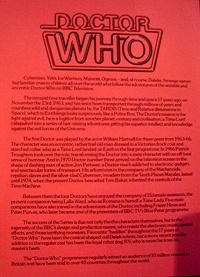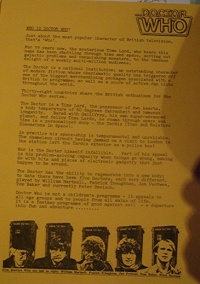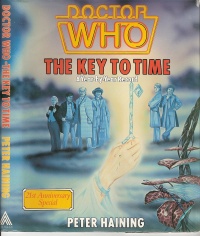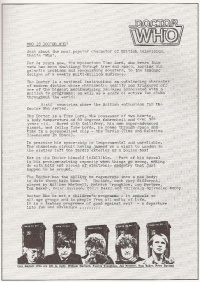110 Million Viewers
MILLIONS OF VIEWERS AROUND THE WORLD...
Whenever Doctor Who reached an important milestone in its long history – such as its 20th Anniversary, or temporary cancellation in 1985 - the BBC press machine would often trot out a series of quotes extolling the popularity of Doctor Who, the number of countries the series was being sold to, and how many people worldwide were enjoying the adventures of our favourite Time Lord. But much of this was hyperbole, and far from the truth. In fact, the BBC very carefully worded its press releases to make it seem that Doctor Who was sold to (present tense) X countries, rather than had been sold to (past tense) X countries, making the series seem to be more popular worldwide than it actually was.
The following series of quotations (presented in chronological order) lifted from numerous newspapers and other publications reveal just how far wide of the truth the BBC was with its claims:
Contents
Fewer than 30 countries
- It has been on television in twenty-seven foreign countries: Australia, Barbados, Chile, Cyprus, Ethiopia, Ghana, Gibraltar, Hong Kong, Iran, Jamaica, Jordan, Kenya, Libya, Mauritius, Mexico, Morocco, New Zealand, Nigeria, Rhodesia, Saudi Arabia, Sierra Leone, Singapore, Thailand, Trinidad and Tobago, Uruguay, Venezuela, and Zambia. [page 8; The Making of Doctor Who; Malcolm Hulke and Terrance Dicks; Pan Books Ltd (Piccolo); published on 20 April 1972]
Missing from this line-up is Aden, Bermuda, Canada, Dominican Republic, Malta, Tunisia, Uganda.
- ... nearly a quarter of the globe are also Who fans. [Daily Mirror; 23 April 1966]
- DR. WHO has been running for 12 years on British TV and has additionally captivated 27 foreign countries… [page 8; Famous Monsters of Filmland #126; July 1976; Warren Publishing Co]
- It has been screened in 23 countries. [Unidentified newspaper; August 1977 (reproduced on page 186 of The Official Doctor Who Fan Club Volume 2; Keith Miller; 2013)]
- Twenty-eight countries share the British enthusiasm for the Dr Who series. [BBC publicity brochure; early 1978]
30 to 40 countries
- The BBC has benefited from sales to 33 countries, among them the United States of America, Venezuela, Thailand and Ethiopia. The programme is still playing in Australia, New Zealand, Canada, Singapore, the Netherlands, Dubai and Hong Kong. [Times of Malta; 19 August 1977]
- ... the series is now being transmitted to 30 countries around the world. [The Daily Mail, 20 January 1979 / page 186; Doctor Who The Key to Time; Peter Haining; W H Allen; 1984]
- ... 30 other countries… [page 14; Super Star Heroes; October 1979]
- ... The "Doctor Who" programmes regularly attract an audience of 10 million viewers in Britain and have been sold in over 40 countries throughout the world. [BBC publicity card; 1980] (PICTURED)
This is the earliest instance of 40 being cited as the figure.
- ... the BBC sells the programme to thirty-six different countries. Doctor Who is easily Britain's most popular TV export. [page 29; A Day with a TV Producer; Graham Rickard; Wayland (Publishers) Ltd; 1980; from material researched in April 1980]
- I've been seen by 100 million viewers in 37 countries and get recognised all over the world. [Tom Baker to The Daily Mail / page 202; Doctor Who The Key to Time; Peter Haining; W H Allen; 1984 / page 16; DWM#195]
- ... a peak of popularity --- 98 million viewers in 38 countries at the last count ... [Daily Express; 21 March 1981]
- ... the series, with 98 million viewers in 38 countries, returns to the screens next January. [unidentified mid-April 1981 newspaper; page 15; DWM#196]
- Thirty-eight countries share the British enthusiasm for the Doctor Who series. [1982 BBC publicity card; 1982] (PICTURED)
- The programme is watched in Britain by almost 10 million viewers and there are another 88 million who follow it in 39 countries around the world. [page 5; The Making of a Television Series; Alan Road; Andre Deutsch Ltd; May 1982]
- ... seen weekly by some 93 million viewers in 39 countries… [Variety; 25 August 1982 / page 245; Doctor Who The Unfolding Text; John Tulloch and Manuel Alvarado; 1983]
- Doctor Who will come of age next year in the 37 countries which take the series ... [making] her known to 100 million viewers. [unidentified magazine interview with Janet Fielding; late 1982]
- ... an international weekly audience of 98 million in 39 countries around the world. [Lionheart promotional brochure, 1982]
- We're sold to 39 countries all around the world, with an audience worldwide of 98 million ... it's even dubbed into Arabic. [John Nathan-Turner radio interview at Longleat; May 1983]
- ... and is now shown in no less than thirty-eight countries. [page 4; Video Times and Games; June 1983]
- ... is now seen weekly by 98 million fans in 38 countries via BBC Enterprises. [page 4; DWM#80; September 1983]
- Today the show is being televised in 39 countries with a viewing audience of 100 million people. [page 14; Doctor Who A Celebration; Peter Haining; W H Allen; 1983]
Note the use of present tense "is being televised", which is clearly incorrect.
- I've done seven years and been seen by 100 million viewers in 37 countries... [John Nathan-Turner quoting Tom Baker, page 162; Doctor Who A Celebration; Peter Haining; W H Allen; 1983]
- … Dr Who adventures have so far been bought by 40 or so countries. [Sunday Express; 20 November 1983]
This is only the second instance where 40 is cited.
54 countries
In early 1983, the year of Doctor Who's 20th Anniversary, the BBC was claiming that up to 39 countries were watching the series. But by July of that same year, the number of countries worldwide suddenly jumped to 54, as the following series of quotations illustrate. It is likely that someone at the BBC decided it was best to undertake a new tally of the total sales there had been over the years. In fact 54 is not all that wide off the mark – by our count, just over 55 countries had indeed screened some Doctor Who at some point or another between 1964 and 1981 (see Selling Doctor Who):
- … Our audience worldwide exceeds a hundred million in 54 countries… [John Nathan-Turner, at a US con in July 1983 (see The Whovians, at 1.09)]
- ... now claims over 100 million viewers in 54 countries. [back cover; Doctor Who The Unfolding Text; John Tulloch and Manuel Alvarado; 1983]
- It is now sold to more than thirty-eight countries and enjoys a huge following across the world. [page 11; Doctor Who The Unfolding Text; John Tulloch and Manuel Alvarado; 1983]
- The programme has been sold to 54 countries and been seen by an international audience of 100 million. [The Times; 14 November 1983]
- Since the programme has been sold to 54 countries, from Abu Dhabi to Zambia ... in some Latin American countries ... where it's Dr Insolito ... [with fan clubs] in Italy, Australia, Canada ... [page 29; Doctor Who 20th Anniversary Special; Radio Times, 19 November 1983]
This magazine is the first BBC-sanctioned publication since The Making of Doctor Who in 1972 to actually name some of the countries.
- ... reaching 110 million viewers in 60 countries. [page 16; New Zealand TV Guide; 19-25 November 1983]
This New Zealand publication was the first instance of 60 countries and 110 million being cited as the world-wide viewing total.
- ... the show is now sold to 54 countries and has an international audience of one hundred million. [John Nathan-Turner; Sunday Express; 10 November 1983 / page 249; Doctor Who The Key to Time; Peter Haining; W H Allen; 1984] (PICTURED)
- Today the TV show is seen in 39 countries, with a viewing audience believed to be about 100 million. [page 12; The Age Green Guide 8 December 1983; Melbourne, Australia; 1983]
- An estimated 100 million viewers in 54 countries from Australia to Zambia have followed his exploits… [page 37; Time Magazine; 9 January 1984]
By early 1984, 110 million became the new total of choice:
- ... [it is] sold to 54 countries with [an] audience world wide of 110 million. [John Nathan-Turner speaking at a convention in Australia, April 1984]
- ... an international cult enjoyed by some 110 million people in many nations and speaking many tongues ... [page 263; Doctor Who The Key to Time; Peter Haining; W H Allen; 1984]
In February 1985 the BBC announced that it was suspending production on Doctor Who for 18 months. The press went almost into melt-down, and began trotting out more facts and figures – probably supplied to them by the BBC itself! – now claiming that a rise by 10 million viewers:
- Doctor Who is seen in 54 countries - from Tokyo to Trinidad, the United States to the Arab Emirates - by over 110 million people. [unknown publication; 1985]
- ... dumping the Doctor will LOSE the corporation money from sales to 54 other countries. It has a world-wide audience of 110 million viewers. [The Sun; 28 February 1985 / page 82; Doctor Who The Eighties; David J Howe, Mark Stammers, Stephen James Walker; Virgin Publishing Ltd; 1996]
- ... the hit series has a staggering 110 million viewers in 54 countries. [Daily Star; 28 February 1985]
- Dr Who is seen in 54 countries around the world by an audience of some 110 million. [Standard; 28 February 1985]
- ... it is seen by 110 million views [sic] in 54 countries ... [Daily Telegraph; 28 February 1985]
- ... the show's 110 million watchers in 54 countries… [The Guardian; 28 February 1985]
- There are 110 million viewers in fifty-four countries… [Peter Haining in February 1985; page 211; Doctor Who The Time-Travellers' Guide; W H Allen; published in September 1987]
- ... there are 110 million [fans] in 54 countries. [New Zealand Herald; 2 March 1985]
- Today it has a following in 54 countries and is watched by more than 100 million earthlings. [New Zealand Listener; 14 April 1985]
- ... its appeal to 110 million viewers in fifty-four countries. [page 10; Doctor Who The TARDIS Inside Out; John Nathan-Turner; Piccadilly Press; Ltd; 1985]
- Doctor Who was amongst the top ten best-selling British TV programmes overseas, reaching 54 different countries and attaining world-wide viewing figures estimated at 110 million. [page 234; Doctor Who The Handbook The Sixth Doctor; David J Howe, Mark Stammers, Stephen James Walker; Virgin Publishing Ltd; 1993 / page 694; Telos Publishing Ltd]
- ... the programme has sold to 54 countries ... [Daily Star; 14 January 1986]
60 countries
When the 18 month hiatus ended, and Doctor Who returned to our screens, the publicity machine now cited 60 countries as the new default quotation; an increase of six countries from the last count (which is supported to some degree by a mid-1985 sale to several countries in the Caribbean):
- Some 110 million viewers worldwide watch Doctor Who ... in more than 60 countries. [The Times; 30 August 1986 / page 213; Doctor Who The Time-Travellers' Guide; W H Allen; published 17 September 1987]
- These days the programme has a world wide audience of 110 million, is seen in 60 countries ... [Today; 6 September 1986; page 22; In Vision #86
- Thirty-eight countries share the British enthusiasm for the Doctor Who television series. [page 14; Doctor Who The Doctor Who File; Peter Haining; W H Allen; 1986]
- ... its worldwide army of fans (over 110 million at the last estimate) ... [page 221; Doctor Who The Doctor Who File; Peter Haining; W H Allen; 1986]
- With over 110 million viewers in 60 countries ... [inside dust-cover flap; Doctor Who 25 Glorious Years; Peter Haining; W H Allen; 1988]
- The show ... now twenty-five years later can claim over 110 million viewers in sixty countries. [page 9; Doctor Who 25 Glorious Years; Peter Haining; W H Allen; 1988]
- ... the BBC was now selling the series to many countries around the world - including places as far flung as Canada, New Zealand and Uganda ... [page 41; Doctor Who 25 Glorious Years; Peter Haining; W H Allen; 1988]
- Sixty countries share the British enthusiasm for the Doctor Who series. [1987 BBC publicity card; page 67; Doctor Who 25 Glorious Years; Peter Haining; W H Allen; 1988] (PICTURED)
- There are currently 110 million avid viewers in 60 countries! [Print ad for US VHS videos; Starlog 141; 1989; 1989]
More than 60 countries
Although Doctor Who had stopped regular production at the end of 1989, this didn't stop soon-to-be-ex-producer John Nathan-Turner and others from trotting out by now well-worn numbers to the press:
- "Doctor Who" is seen on television regularly in 65 countries with a world-wide audience of 110 million. [John Nathan-Turner introduction; page 2; Doctor Who The Ultimate Adventure Souvenir Brochure; 1989]
- BBC Enterprises have sold the programme to RTL-Plus making Germany the 66th country to have bought the series. [page 5; DWM#155; December 1989]
- ... the programme became a hit throughout the world. It was sold to 60 countries, commanding a regular viewing audience estimated at 110m. [The Sunday Times; 20 June 1993 / page 25; In Vision #107]
- Since 1963, Doctor Who has reached a worldwide audience of 110 million. [page 36; Radio Times 20-26 November 1993]
- At its height the series attracted 16m viewers in Britain, and 110m worldwide in 70 countries. [The Sunday Times; 6 March 1994 / page 39; DWM#212; May 1994]
The above Sunday Times piece is from a report on Steven Spielberg's apparent "interest" in taking on the series.
- Doctor Who has a worldwide audience in excess of 110 million, with the series reaching over 60 countries, from Australia to Zimbabwe [page 4; Doctor Who Poster Book; Adrian Rigelsford; Boxtree Ltd; 1995]
- Doctor Who was on in 93 countries – in America alone it was on more than 240 stations. [Tom Baker interview; page 32; Radio Times; 13-19 November 1999]
Tom is clearly exaggerating here; nowhere else has a figure as high as 93 ever been given before or since!
- In its heyday, Doctor Who had a worldwide audience of more than 110 million ... it has been shown in 66 countries around the world, from Abu Dhabi and Algeria to Poland, Qatar, Taiwan and Zimbabwe. [page 6; Doctor Who 40th Anniversary PanoptiCon Souvenir Booklet; 2003]
- In its heyday, Doctor Who had a worldwide audience in excess of 110 million, being screened in more than 60 countries from Australia to Zimbabwe. [page 14; Andrew Beech; Doctor Who 40th Anniversary PanoptiCon Souvenir Booklet; 2003]
There we have two conflicting totals – 66 and 60 - in the same publication!
Days after the official announcement that Doctor Who was going back into production, the BBC couldn't but help dust off its old "quotations on file" and cited 60 as the number of countries – a direct quotation from the PanoptiCon brochure:
- Doctor Who has been shown in 60 countries around the world, from Abu Dhabi and Algeria to Poland, Qatar, Taiwan and Zimbabwe [11 November 2003 BBC Press Release]
.
Summary
When all these references are grouped into chronological order like this, a clear pattern emerges.
- 27 countries by late 1971
- 30-37 countries by late 1980, with 93-100 million viewers
- 38-39 countries by early 1983, with 98 million
- 54 countries by July 1983, and with 100 million viewers (1)
- 54 countries still, from early 1985, but now with 110 million viewers worldwide
- 60 countries by late 1986, still at 110 million (2)
- 66 countries by early 1989, but still only 110 million
- 60 countries again by 2003
(1) a massive jump by 15 countries between April and July of the anniversary year; more likely to be the result of a recount of existing 1960s/1970s sales data, rather than being wholly due to 15 new sales that year
- In fact, during July 1983, when the first of our listed claims of "54" was being made, Doctor Who was on the air in only eight countries: Australia, New Zealand, Canada, United States, Gibraltar, Brunei, Costa Rica and the United Arab Emirates (refer to the Airdates tables for each of those countries).
(2) a jump from 54 to 60 countries, and viewers by 10 million in the space of a year; the 10 million might be attributed to further sales within just the USA rather than due to the addition of six 'new' countries. (By early 1987, sales to the US had reached over 185 stations.)
As BroaDWcast shows, more than 80 countries have screened some episodes of Doctor Who at some point over the years, but not all the episodes, and certainly not at the same time, as the BBC would sometimes have us believe.
The totals cited in these examples are all accumulative. So it's clear that the BBC was often exaggerating its claims somewhat. Re-read all the quotations above, and substitute present tense statements ("IS watched...", "IS now being…", "IS seen…", etc) with past tense ("WAS watched...", "HAS been…", "WAS seen…", etc) and a more accurate picture is revealed.
.




